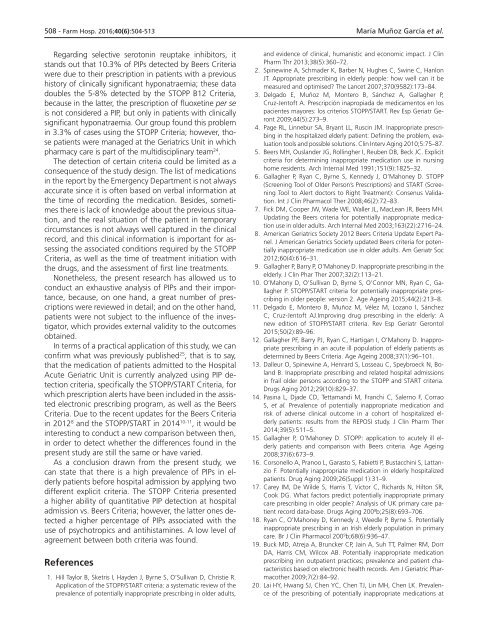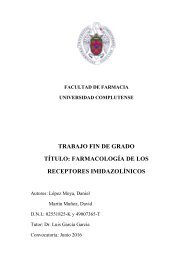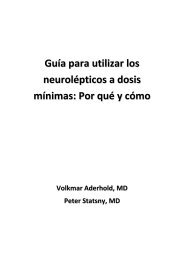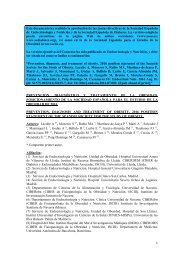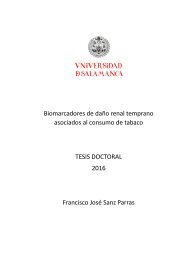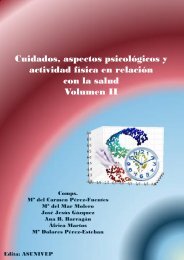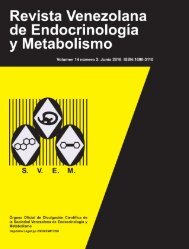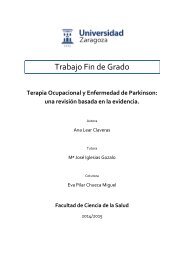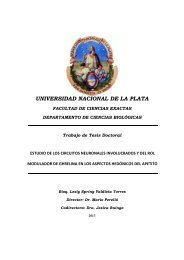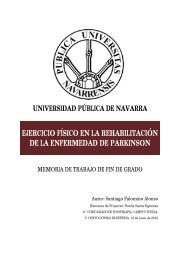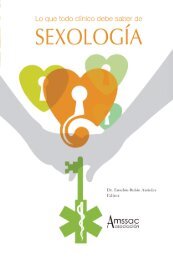Noviembre-Diciembre
156_v40n6(1)
156_v40n6(1)
Create successful ePaper yourself
Turn your PDF publications into a flip-book with our unique Google optimized e-Paper software.
508 - Farm Hosp. 2016;40(6):504-513 María Muñoz García et al.<br />
Regarding selective serotonin reuptake inhibitors, it<br />
stands out that 10.3% of PIPs detected by Beers Criteria<br />
were due to their prescription in patients with a previous<br />
history of clinically significant hyponatraemia; these data<br />
doubles the 5-8% detected by the STOPP B12 Criteria,<br />
because in the latter, the prescription of fluoxetine per se<br />
is not considered a PIP, but only in patients with clinically<br />
significant hyponatraemia. Our group found this problem<br />
in 3.3% of cases using the STOPP Criteria; however, those<br />
patients were managed at the Geriatrics Unit in which<br />
pharmacy care is part of the multidisciplinary team 24 .<br />
The detection of certain criteria could be limited as a<br />
consequence of the study design. The list of medications<br />
in the report by the Emergency Department is not always<br />
accurate since it is often based on verbal information at<br />
the time of recording the medication. Besides, sometimes<br />
there is lack of knowledge about the previous situation,<br />
and the real situation of the patient in temporary<br />
circumstances is not always well captured in the clinical<br />
record, and this clinical information is important for assessing<br />
the associated conditions required by the STOPP<br />
Criteria, as well as the time of treatment initiation with<br />
the drugs, and the assessment of first line treatments.<br />
Nonetheless, the present research has allowed us to<br />
conduct an exhaustive analysis of PIPs and their importance,<br />
because, on one hand, a great number of prescriptions<br />
were reviewed in detail; and on the other hand,<br />
patients were not subject to the influence of the investigator,<br />
which provides external validity to the outcomes<br />
obtained.<br />
In terms of a practical application of this study, we can<br />
confirm what was previously published 25 , that is to say,<br />
that the medication of patients admitted to the Hospital<br />
Acute Geriatric Unit is currently analyzed using PIP detection<br />
criteria, specifically the STOPP/START Criteria, for<br />
which prescription alerts have been included in the assisted<br />
electronic prescribing program, as well as the Beers<br />
Criteria. Due to the recent updates for the Beers Criteria<br />
in 2012 8 and the STOPP/START in 2014 10-11 , it would be<br />
interesting to conduct a new comparison between then,<br />
in order to detect whether the differences found in the<br />
present study are still the same or have varied.<br />
As a conclusion drawn from the present study, we<br />
can state that there is a high prevalence of PIPs in elderly<br />
patients before hospital admission by applying two<br />
different explicit criteria. The STOPP Criteria presented<br />
a higher ability of quantitative PIP detection at hospital<br />
admission vs. Beers Criteria; however, the latter ones detected<br />
a higher percentage of PIPs associated with the<br />
use of psychotropics and antihistamines. A low level of<br />
agreement between both criteria was found.<br />
References<br />
1. Hill Taylor B, Sketris I, Hayden J, Byrne S, O’Sullivan D, Christie R.<br />
Application of the STOPP/START criteria: a systematic review of the<br />
prevalence of potentially inappropriate prescribing in older adults,<br />
and evidence of clinical, humanistic and economic impact. J Clin<br />
Pharm Thr 2013;38(5):360–72.<br />
2. Spinewine A, Schmader K, Barber N, Hughes C, Swine C, Hanlon<br />
JT. Appropriate prescribing in elderly people: how well can it be<br />
measured and optimised? The Lancet 2007;370(9582):173–84.<br />
3. Delgado E, Muñoz M, Montero B, Sánchez A, Gallagher P,<br />
Cruz-Jentoft A. Prescripción inapropiada de medicamentos en los<br />
pacientes mayores: los criterios STOPP/START. Rev Esp Geriatr Geront<br />
2009;44(5):273–9.<br />
4. Page RL, Linnebur SA, Bryant LL, Ruscin JM. Inappropriate prescribing<br />
in the hospitalized elderly patient: Defining the problem, evaluation<br />
tools and possible solutions. Clin Interv Aging 2010;5:75–87.<br />
5. Beers MH, Ouslander JG, Rollingher I, Reuben DB, Beck JC. Explicit<br />
criteria for determining inappropriate medication use in nursing<br />
home residents. Arch Internal Med 1991;151(9):1825–32.<br />
6. Gallagher P, Ryan C, Byrne S, Kennedy J, O’Mahoney D. STOPP<br />
(Screening Tool of Older Person’s Prescriptions) and START (Screening<br />
Tool to Alert doctors to Right Treatment): Consenus Validation.<br />
Int J Clin Pharmacol Ther 2008;46(2):72–83.<br />
7. Fick DM, Cooper JW, Wade WE, Waller JL, MacLean JR, Beers MH.<br />
Updating the Beers criteria for potentially inappropriate medication<br />
use in older adults. Arch Internal Med 2003;163(22):2716–24.<br />
8. American Geriatrics Society 2012 Beers Criteria Update Expert Panel.<br />
J American Geriatrics Society updated Beers criteria for potentially<br />
inappropriate medication use in older adults. Am Geriatr Soc<br />
2012;60(4):616–31.<br />
9. Gallagher P, Barry P, O’Mahoney D. Inappropriate prescribing in the<br />
elderly. J Clin Phar Ther 2007;32(2):113–21.<br />
10. O’Mahony D, O’Sullivan D, Byrne S, O’Connor MN, Ryan C, Gallagher<br />
P. STOPP/START criteria for potentially inappropriate prescribing<br />
in older people: version 2. Age Ageing 2015;44(2):213–8.<br />
11. Delgado E, Montero B, Muñoz M, Vélez M, Lozano I, Sánchez<br />
C, Cruz-Jentoft AJ.Improving drug prescribing in the elderly: A<br />
new edition of STOPP/START criteria. Rev Esp Geriatr Gerontol<br />
2015;50(2):89–96.<br />
12. Gallagher PF, Barry PJ, Ryan C, Hartigan I, O’Mahony D. Inappropriate<br />
prescribing in an acute ill population of elderly patients as<br />
determined by Beers Criteria. Age Ageing 2008;37(1):96–101.<br />
13. Dalleur O, Spinewine A, Henrard S, Losseau C, Speybroeck N, Boland<br />
B. Inappropriate prescribing and related hospital admissions<br />
in frail older persons according to the STOPP and START criteria.<br />
Drugs Aging 2012;29(10):829–37.<br />
14. Pasina L, Djade CD, Tettamandi M, Franchi C, Salerno F, Corrao<br />
S, et al. Prevalence of potentially inappropriate medication and<br />
risk of adverse clinical outcome in a cohort of hospitalized elderly<br />
patients: results from the REPOSI study. J Clin Pharm Ther<br />
2014;39(5):511–5.<br />
15. Gallagher P, O’Mahoney D. STOPP: application to acutely ill elderly<br />
patients and comparison with Beers criteria. Age Ageing<br />
2008;37(6):673–9.<br />
16. Corsonello A, Pranoo L, Garasto S, Fabietti P, Bustacchini S, Lattanzio<br />
F. Potentially inappropriate medication in elderly hospitalized<br />
patients. Drug Aging 2009;26(Suppl 1):31–9.<br />
17. Carey IM, De Wilde S, Harris T, Victor C, Richards N, Hilton SR,<br />
Cook DG. What factors predict potentially inappropriate primary<br />
care prescribing in older people? Analysis of UK primary care patient<br />
record data-base. Drugs Aging 200 8 b;25(8):693–706.<br />
18. Ryan C, O’Mahoney D, Kennedy J, Weedle P, Byrne S. Potentially<br />
inappropriate prescribing in an Irish elderly population in primary<br />
care. Br J Clin Pharmacol 200 9 b;68(6):936–47.<br />
19. Buck MD, Atreja A, Bruncker CP, Jain A, Suh TT, Palmer RM, Dorr<br />
DA, Harris CM, Wilcox AB. Potentially inappropriate medication<br />
prescribing inn outpatient practices; prevalence and patient characteristics<br />
based on electronic health records. Am J Geriatric Pharmacother<br />
2009;7(2):84–92.<br />
20. Lai HY, Hwang SJ, Chen YC, Chen TJ, Lin MH, Chen LK. Prevalence<br />
of the prescribing of potentially inappropriate medications at


